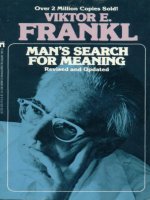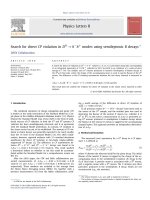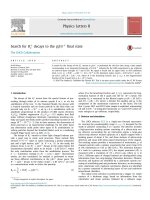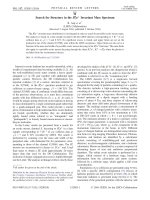Man's Search For Meaning
Bạn đang xem bản rút gọn của tài liệu. Xem và tải ngay bản đầy đủ của tài liệu tại đây (1.15 MB, 224 trang )
DR. VIKTOR E. FRANKL is Europe's leading psy-
chiatrist. His new theory, logotherapy, has rocketed
him to fame as the leader of the Third Viennese School
of Psychotherapy and the most significant modern
thinker in the field. Since 1961, when he was visiting
professor at Harvard University's summer school, Dr.
Frankl has been a frequent lecturer in this country.
"The story of a man who became a number who
became a person. Today Frankl is one of the most
gifted of all psychiatrists. Frankl developed his ideas,
now generally known as the Third School of Viennese
Psychiatry—the school of logotherapy. The incredible
attempts to dehumanize man at the concentration
camps of Auschwitz and Dachau led Frankl to com-
mence the humanization of psychiatry through lo-
gotherapy. Frankl is a professional who possesses the
rare ability to write in a layman's language."
—Gerald F. Kreyche, DePaul University
MAN'S SEARCH FOR MEANING
is a revised and enlarged version of From Death-Camp
to Existentialism, which was selected as "Book of the
Year" by Colby College, Baker University, Earlham
College, Olivet Nazarene College, and St. Mary's
Dominican College.
"IF YOU READ BUT ONE BOOK THIS
YEAR, DR. FRANKL'S BOOK SHOULD
BE THAT ONE." —Los Angeles Times
Books by Viktor E. Frankl
Man's Search for Meaning
Psychotherapy and Existentialism
The Unconscious God
The Unheard Cry for Meaning
Published by WASHINGTON SQUARE PRESS
Most Washington Square Press Books are available at special quantity
discounts for bulk purchases for sales promotions, premiums or fund
raising. Special books or book excerpts can also be created to fit
specific needs.
For details write the office of the Vice President of Special Markets,
Pocket Books, 1230 Avenue of the Americas, New York, New York
10020.
VIKTOR E.
FRANKL
MAN'S SEARCH
FOR MEANING
Revised and Updated
WASHINGTON SQUARE PRESS
PUBLISHED BY POCKET BOOKS
New York London Toronto Sydney Tokyo Singapore
First published in Austria in 1946, under the title Ein Psycholog erlebt das
Konzentrationslager. This translation first published by Beacon Press in
1959. Beacon Press books are published under the auspices of the Unitarian
Universalist Association.
A Washington Square Press Publication of
POCKET BOOKS, a division of Simon & Schuster Inc.
1230 Avenue of the Americas, New York, NY 10020
Copyright © 1959, 1962, 1984 by Victor E. Frankl
Cover photo copyright © 1984 János Kalmár
All rights reserved, including the right to reproduce
this book or portions thereof in any form whatsoever.
For information address Beacon Press,
25 Beacon Street, Boston, MA 02108
ISBN: 0-671-66736-X
First Washington Square Press printing February 1985
14 13 12 11 10 9
WASHINGTON SQUARE PRESS and WSP colophon are
registered trademarks of Simon & Schuster Inc.
Printed in the U.S.A.
To the memory of my mother
Contents
Preface by Gordon W. Allport
Preface to the 1984 Edition
PART ONE
Experiences in a Concentration Camp
PART TWO
Logotherapy in a Nutshell
POSTSCRIPT 1984
The Case for a Tragic Optimism
Bibliography
9
15
19
117
159
181
Preface
DR. FRANKL, AUTHOR-PSYCHIATRIST, SOMETIMES
asks his patients who suffer from a multitude of tor-
ments great and small, "Why do you not commit
suicide?" From their answers he can often find the
guide-line for his psychotherapy: in one life there is
love for one's children to tie to; in another life, a talent
to be used; in a third, perhaps only lingering memories
worth preserving. To weave these slender threads of a
broken life into a firm pattern of meaning and respon-
sibility is the object and challenge of logotherapy,
which is Dr. Frankl's own version of modern existen-
tial analysis.
In this book, Dr. Frankl explains the experience
which led to his discovery of logotherapy. As a long-
time prisoner in bestial concentration camps he found
himself stripped to naked existence. His father,
mother, brother, and his wife died in camps or were
sent to the gas ovens, so that, excepting for his sister,
his entire family perished in these camps. How could
he - every possession lost, every value destroyed,
suffering from hunger, cold and brutality, hourly ex-
9
PREFACE
pecting extermination - how could he find life worth
preserving? A psychiatrist who personally has faced
such extremity is a psychiatrist worth listening to. He,
if anyone, should be able to view our human condition
wisely and with compassion. Dr. Frankl's words have
a profoundly honest ring, for they rest on experiences
too deep for deception. What he has to say gains in
prestige because of his present position on the Medical
Faculty of the University in Vienna and because of the
renown of the logotherapy clinics that today are
springing up in many lands, patterned on his own
famous Neurological Policlinic in Vienna.
One cannot help but compare Viktor Frankl's ap-
proach to theory and therapy with the work of his
predecessor, Sigmund Freud. Both physicians con-
cern themselves primarily with the nature and cure of
neuroses. Freud finds the root of these distressing
disorders in the anxiety caused by conflicting and
unconscious motives. Frankl distinguishes several
forms of neurosis, and traces some of them (the
noögenic neuroses) to the failure of the sufferer to find
meaning and a sense of responsibility in his existence.
Freud stresses frustration in the sexual life; Frankl,
frustration in the "will-to-meaning." In Europe today
there is a marked turning away from Freud and a
widespread embracing of existential analysis, which
takes several related forms - the school of logotherapy
being one. It is characteristic of Frankl's tolerant
outlook that he does not repudiate Freud, but builds
gladly on his contributions; nor does he quarrel with
other forms of existential therapy, but welcomes kin-
ship with them.
The present narrative, brief though it is, is artfully
10
PREFACE
constructed and gripping. On two occasions I have
read it through at a single sitting, unable to break away
from its spell. Somewhere beyond the midpoint of the
story Dr. Frankl introduces his own philosophy of
logotherapy. He introduces it so gently into the contin-
uing narrative that only after finishing the book does
the reader realize that here is an essay of profound
depth, and not just one more brutal tale of concentra-
tion camps.
From this autobiographical fragment the reader
learns much. He learns what a human being does
when he suddenly realizes he has "nothing to lose
except his so ridiculously naked life." Frankl's
description of the mixed flow of emotion and apathy is
arresting. First to the rescue comes a cold detached
curiosity concerning one's fate. Swiftly, too, come
strategies to preserve the remnants of one's life,
though the chances of surviving are slight. Hunger,
humiliation, fear and deep anger at injustice are ren-
dered tolerable by closely guarded images of beloved
persons, by religion, by a grim sense of humor, and
even by glimpses of the healing beauties of nature - a
tree or a sunset.
But these moments of comfort do not establish the
will to live unless they help the prisoner make larger
sense out of his apparently senseless suffering. It is
here that we encounter the central theme of existen-
tialism: to
live is to suffer, to survive is to find meaning
in the suffering. If there is a purpose in life at all, there
must be a purpose in suffering and in dying. But no
man can tell another what this purpose is. Each must
find out for himself, and must accept the responsibility
that his answer prescribes. If he succeeds he will
11
PREFACE
continue to grow in spite of all indignities. Frankl is
fond of quoting Nietzsche, "He who has a why to live
can bear with almost any how."
In the concentration camp every circumstance con-
spires to make the prisoner lose his hold. All the
familiar goals in life are snatched away. What alone
remains is "the last of human freedoms" - the ability
to "choose one's attitude in a given set of circum-
stances." This ultimate freedom, recognized by the
ancient Stoics as well as by modern existentialists
,
takes on vivid significance in Frankl's story. The pris-
oners were only average men, but some, at least, by
choosing to be "worthy of their suffering" proved
man's capacity to rise above his outward fate.
As a psychotherapist, the author, of course, wants
to know how men can be helped to achieve this
distinctively human capacity. How can one awaken in
a patient the feeling that he is responsible to life for
something, however grim his circumstances may be?
Frankl gives us a moving account of one collective
therapeutic session he held with his fellow prisoners.
At the publisher's request Dr. Frankl has added a
statement of the basic tenets of logotherapy as well as
a bibliography. Up to now most of the publications of
this "Third Viennese School of Psychotherapy" (the
predecessors being the Freudian and Adlerian
Schools) have been chiefly in German. The reader wil
l
therefore welcome Dr. Frankl's supplement to his
personal narrative.
Unlike many European existentialists, Frankl is nei
-
ther pessimistic nor antireligious. On the contrary, for
a writer who faces fully the ubiquity of suffering and
the forces of evil, he takes a surprisingly hopeful view
12
PREFACE
of man's capacity to transcend his predicament and
discover an adequate guiding truth.
I recommend this little book heartily, for it is a gem
of dramatic narrative, focused upon the deepest of
human problems. It has literary and philosophical
merit and provides a compelling introduction to the
most significant psychological movement of our day.
GORDON W. ALLPORT
Gordon W. Allport, formerly a professor of psychology at Har-
vard University, was one of the foremost writers and teachers in the
field in this hemisphere. He was author of a large number of original
works on psychology and was the editor of the Journal of Abnormal
and Social Psychology. It is chiefly through the pioneering work of
Professor Allport that Dr. Frankl's momentous theory was intro-
duced to this country; moreover, it is to his credit that the interest
shown here in logotherapy is growing by leaps and bounds.
13
Preface to the
1984 Edition
THIS BOOK HAS NOW LIVED TO SEE ITS SEVENTY-
third printing in English - in addition to having been
published in nineteen other languages. And the En-
glish editions alone have sold almost two and a half
million copies.
These are the dry facts, and they may well be the
reason why reporters of American newspapers and
particularly of American TV stations more often than
not start their interviews, after listing these facts, by
exclaiming: "Dr. Frankl, your book has become a true
bestseller - how do you feel about such a success?"
Whereupon I react by reporting that in the first place I
do not at all see in the bestseller status of my book so
much an achievement and accomplishment on my par
t
as an expression of the misery of our time: if hundreds
of thousands of people reach out for a book whose
very title promises to deal with the question of a
meaning to life, it must be a question that burns under
their fingernails.
To be sure, something else may have contributed to
the impact of the book: its second, theoretical par
t
15
PREFACE TO THE 1984 EDITION
("Logotherapy in a Nutshell") boils down, as it were,
to the lesson one may distill from the first part, the
autobiographical account ("Experiences in a Concen-
tration Camp"), whereas Part One serves as the exis-
tential validation of my theories. Thus, both parts
mutually support their credibility.
I had none of this in mind when I wrote the book in
1945. And I did so within nine successive days and
with the firm determination that the book would be
published anonymously. In fact, the first printing of
the original German version does not show my name
on the cover, though at the last moment, just before
the book's initial publication, I did finally give in to my
friends who had urged me to let it be published with
my name at least on the title page. At first, however, it
had been written with the absolute conviction that, as
an anonymous opus, it could never earn its author
literary fame. I had wanted simply to convey to the
reader by way of a concrete example that life holds a
potential meaning under any conditions, even the most
miserable ones. And I thought that if the point were
demonstrated in a situation as extreme as that in a
concentration camp, my book might gain a hearing. I
therefore felt responsible for writing down what I had
gone through, for I thought it might be helpful to
people who are prone to despair.
And so it is both strange and remarkable to me
that - among some dozens of books I have authored -
precisely this one, which I had intended to be pub-
lished anonymously so that it could never build up any
reputation on the part of the author, did become a
success. Again and again I therefore admonish my
students both in Europe and in America: "Don't aim
16
PREFACE TO THE 1984 EDITION
at success - the more you aim at it and make it a
target, the more you are going to miss it. For success,
like happiness, cannot be pursued; it must ensue, and
it only does so as the unintended side-effect of one's
personal dedication to a cause greater than oneself or
as the by-product of one's surrender to a person other
than oneself. Happiness must happen, and the same
holds for success: you have to let it happen by not
caring about it. I want you to listen to what your
conscience commands you to do and go on to carry it
out to the best of your knowledge. Then you will live
to see that in the long run - in the long run, I say! -
success will follow you precisely because you had
forgotten to think of it."
Should the following text of this book, dear reader,
give you a lesson to learn from Auschwitz, the forego-
ing text of its preface can give you a lesson to learn
from an unintentional bestseller.
As to this new edition, a chapter has been added in
order to update the theoretical conclusions of the
book. Drawn from a lecture I gave as the honorary
president of the Third World Congress of Logotherapy
in the Auditorium Maximum of Regensburg University
in West Germany (June 1983), it now forms the "Post-
script 1984" to this book and is entitled "The Case for
a Tragic Optimism." The chapter addresses present-
day concerns and how it is possible to "say yes to life"
in spite of all the tragic aspects of human existence. To
hark back to its title, it is hoped that an
"optimism"
for our future may flow from the lesson learned from
our "tragic" past.
V.E.F.
Vienna, 1983
17
PART ONE
Experiences in a
Concentration Camp
THIS BOOK DOES NOT CLAIM TO BE AN ACCOUNT OF
facts and events but of personal experiences, experi-
ences which millions of prisoners have suffered time
and again. It is the inside story of a concentration
camp, told by one of its survivors. This tale is not
concerned with the great horrors, which have already
been described often enough (though less often be-
lieved), but with the multitude of small torments. In
other words, it will try to answer this question: How
was everyday life in a concentration camp reflected in
the mind of the average prisoner?
Most of the events described here did not take place
in the large and famous camps, but in the small ones
where most of the real extermination took place. This
story is not about the suffering and death of great
heroes and martyrs, nor is it about the prominent
Capos - prisoners who acted as trustees, having spe-
cial privileges - or well-known prisoners. Thus it is not
so much concerned with the sufferings of the mighty,
but with the sacrifices, the crucifixion and the deaths
of the great army of unknown and unrecorded victims.
21
MAN'S SEARCH FOR MEANING
It was these common prisoners, who bore no distin-
guishing marks on their sleeves, whom the Capos
really despised. While these ordinary prisoners had
little or nothing to eat, the Capos were never hungry;
in fact many of the Capos fared better in the camp than
they had in their entire lives. Often they were harder
on the prisoners than were the guards, and beat them
more cruelly than the SS men did. These Capos, of
course, were chosen only from those prisoners whose
characters promised to make them suitable for such
procedures, and if they did not comply with what was
expected of them, they were immediately demoted.
They soon became much like the SS men and the camp
wardens and may be judged on a similar psychological
basis.
It is easy for the outsider to get the wrong concep-
tion of camp life, a conception mingled with sentiment
and pity. Little does he know of the hard fight for
existence which raged among the prisoners. This was
an unrelenting struggle for daily bread and for life
itself, for one's own sake or for that of a good friend.
Let us take the case of a transport which was
officially announced to transfer a certain number of
prisoners to another camp; but it was a fairly safe
guess that its final destination would be the gas cham-
bers. A selection of sick or feeble prisoners incapable
of work would be sent to one of the big central camps
which were fitted
with gas chambers and crematori-
ums. The selection process was the signal for a free
fight among all the prisoners, or of group against
group. All that mattered was that one's own name and
that of one's friend were crossed off the list of victims
,
22
EXPERIENCES IN A CONCENTRATION CAMP
though everyone knew that for each man saved an-
other victim had to be found.
A definite number of prisoners had to go with each
transport. It did not really matter which, since each of
them was nothing but a number. On their admission to
the camp (at least this was the method in Auschwitz)
all their documents had been taken from them, to-
gether with their other possessions. Each prisoner,
therefore, had had an opportunity to claim a fictitious
name or profession; and for various reasons many did
this. The authorities were interested only in the cap-
tives' numbers. These numbers were often tattooed on
their skin, and also had to be sewn to a certain spot on
the trousers, jacket, or coat. Any guard who wanted to
make a charge against a prisoner just glanced at his
number (and how we dreaded such glances!); he never
asked for his name.
To return to the convoy about to depart. There was
neither time nor desire to consider moral or ethical
issues. Every man was controlled by one thought
only: to keep himself alive for the family waiting for
him at home, and to save his friends. With no hesita-
tion, therefore, he would arrange for another prisoner,
another "number," to take his place in the transport.
As I have already mentioned, the process of select-
ing Capos was a negative one; only the most brutal of
the prisoners were chosen for this job (although there
were some happy exceptions). But apart from the
selection of Capos which was
undertaken by the SS,
there was a sort of self-selecting process going on the
whole time among all of the prisoners. On the average,
only those prisoners could keep alive who, after years
of trekking from camp to camp, had lost all scruples in
23









